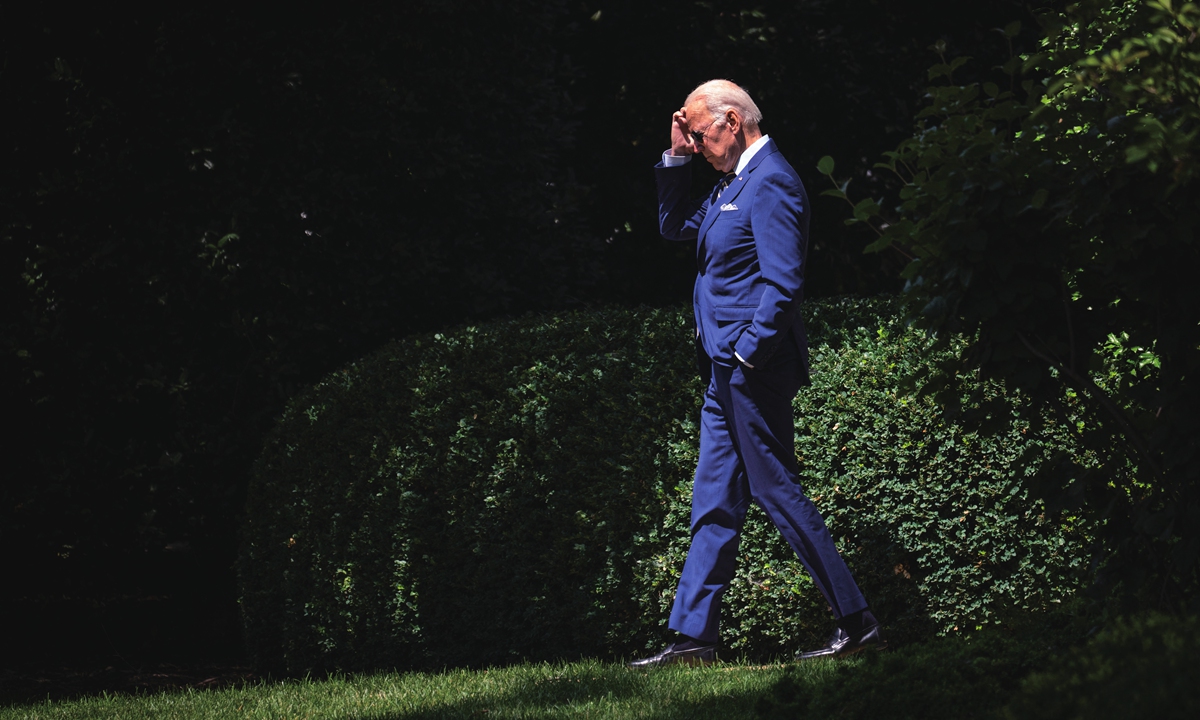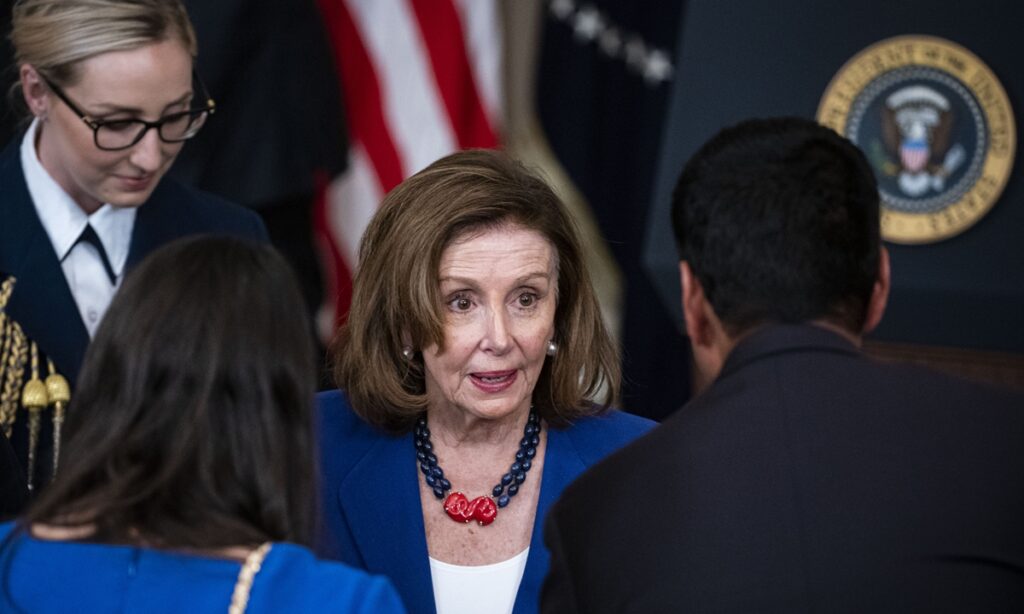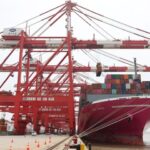After China warned of “strong and resolute measures” over US House speaker Nancy Pelosi’s planned Taiwan trip, US President Joe Biden on Wednesday hinted the Pentagon opposed Pelosi’s trip. Chinese observers believe that Biden administration has clearly received China’s message about a possible diplomatic and military response, which could be something the US is not able to afford.
Amid risks of aggravating ties with China and a 40-year high inflation, the Biden administration urgently needs to seek high-level engagement with China, but Chinese observers warn that Biden may use this engagement to trade for China’s compromise in future bilateral trade arrangements or China’s stance on Russia-Ukraine conflict, not out of intention to sincerely correct its mistakes, and China does not buy such a trick.
When asked whether it’s a good idea for Pelosi to visit Taiwan this summer, Biden said “The military thinks it’s not a good idea right now, but I don’t know what the status of it is.”
In response to Biden’s latest remarks, Wang Wenbin, spokesperson of the Chinese Foreign Ministry, said at media briefing Thursday that if Pelosi visits Taiwan, it would seriously violate the one-China principle and harm China’s sovereignty and territorial integrity and the political foundation of China-US relations.
“If the US insists on going its own way, China will take strong countermeasures. We mean what we say,” Wang stressed.
US lawmakers have been trying to recklessly push forward the agenda of restoring “official relations” with Taiwan authorities, either for personal political gains or for the need to salvage the Democratic Party, which is facing headwinds in the midterm elections, the US government needs to be more careful on that, as it has to consider the overall national interests and strategy, Yang Xiyu, a senior research fellow at the China Institute of International Studies, told the Global Times.
He said Biden may share the same concerns with the military on Pelosi’s planned trip, as US government knew Pelosi’s planned visit was playing with fire and it could seriously aggravate the cross-Straits tension, possibly triggering a Chinese military response.
As Biden said that the US military thinks “It’s not a good idea,” then it means he has consulted the case with the Pentagon, Lü Xiang, an expert on US studies at the Chinese Academy of Social Sciences, told the Global Times on Thursday.
Biden’s remarks also suggest that Pelosi and her colleagues had already made plans to visit Taiwan, despite the speaker’s office has neither confirmed nor denied the schedule, Lü said.
“I believe the US side has already received the message from China about the possibility of extremely drastic diplomatic and military measures against the US, and the US cannot afford to face such a response” the expert said.
According to Lü, the US Department of Defense generally doesn’t clearly states whether a trip is to be made or not, they usually make a list of possible scenarios and weigh the risks and costs for a visit like Pelosi’s. “Biden’s reaction suggested that the conclusion from military is very likely definitive and it will amount to cancelling Pelosi’s trip.”
Pelosi’s office also told the Washington Post on Thursday that “We do not confirm or deny international travel in advance due to long-standing security protocols.”
Lü said he believes that Pelosi’s office may eventually deny Pelosi’s plan of visiting the island based on the shaky response.

US President Joe Biden, who is fully vaccinated and received two boosters, tested positive for COVID-19 on July 21, 2022, and was “experiencing very mild symptoms,” according to the White House. The photo shows Biden departing the Oval Office and walking to Marine One on the South Lawn of the White House on July 20, 2022 in Washington. Photo: AFP
High-level talk?
With or without Pelosi’s visit, China-US relations are likely to experience a continued decline partially because a series of new anti-China bills and policies are about to be introduced in the US, analysts said, noting the escalating tensions of bilateral ties will greatly hurt the US, while there have been plenty of calls for Biden to improve China-US relations and remove tariffs.
Former US secretary of state Henry Kissinger in an interview on Tuesday warned Biden against “endless confrontation” with China.
According to Reuters, importers of technology products from China paid over $32 billion worth of tariffs imposed by President Donald Trump between mid-2018 to the end of 2021, and Ed Brzytwa, the Consumer Technology Association’s vice president of international trade, said in a statement that the tariffs were hurting US businesses, not solving China trade challenges.
Amid extreme difficulties at home and abroad, and especially given the new low of his public approval rate, which casts a shadow on the Democratic Party’s midterm elections, Biden has an urgent need to stabilize relations with China, and that’s why he proposed again to talk to the Chinese leader, analysts said.
Biden said on Wednesday that he expected to talk to Chinese President Xi Jinping within the next 10 days, but he dodged the question of whether he would address tariffs during the proposed talks.
However, Yang warned that even if the talks happen, Biden might turn the high-level talks, a platform to lead bilateral relations, into a tool for its China policy, and China will not buy the tactic.
Removing tariffs on imported Chinese goods will strip 1 percent off inflation in the US over time which could help Biden at the ballot box, former US ambassador David Adelman told CNBC in June.
The US has been talking its own game on tariffs cut and they may also want to trade tariff cut for a shift in China’s neutral stance on the Russia-Ukraine conflict, but China won’t do this deal, Lü said.
China also won’t buy it if the 79-year-old Biden seeks to use the 82-year-old Pelosi as a bargaining chip, Lü said.
Diao Daming, an associate professor at the Renmin University of China in Beijing also warned that for now the US is more likely to be tweaking the tariffs to its own advantage than fully correcting its mistakes.
Despite Biden sidestepped the tariff question, analysts said the US should remove tariffs on China as it harms others without benefiting oneself.
Treasury Secretary Janet Yellen has recently called for eliminating some of those tariffs as a way to ease domestic inflation, AP reported.
Tensions to escalate
Although the US’ midterm elections focus more on domestic issues, such as inflation, Democrats may try to attract attention and support from voters using some extreme diplomatic moves, such as Pelosi’s visit, Yang said.
Both the US government and the Congress, from the perspective of policy implementation and legislation, will intensify the exploitation of the Taiwan question before the midterm elections, and more lawmakers may make some eye-catching moves such as visiting the island or supporting some bills out of political interest, analysts warned.
And it’s likely the US may move to further gradually upgrade relations with Taiwan authorities, Yang said.
Lü warned that with enhanced provocations from the US, China should be prepared to see China-US relations change at anytime, including some changes that could take place overnight.
Lü said it is likely that incidents worse than the 2001 midair collision involving a US plane and a Chinese fighter jet near Hainan Province may take place in the future, but China will have to make sure that the consequences of continuously provoking China are unbearable for the US.
Speaking at the Aspen Security Forum in Colorado on Wednesday, Chinese Ambassador to the US Qin Gang said that the Taiwan question is at the core of China-US relations, tensions have lately risen across the Taiwan Straits and the one-China principle is now under threat.
In recent years, the Taiwan authorities refused to accept the one-China principle and pursued a “gradual Taiwan independence” with the help of the US, and the US has been distorting and hollowing out the one-China policy, Qin said, urging the US to work with China to firmly oppose and contain “Taiwan independence.”
Source:- Global Times
US President Joe Biden, who is fully vaccinated and received two boosters, tested positive for COVID-19 on July 21, 2022, and was “experiencing very mild symptoms,” according to the White House. The photo shows Biden departing the Oval Office and walking to Marine One on the South Lawn of the White House on July 20, 2022 in Washington. Photo: AFP




